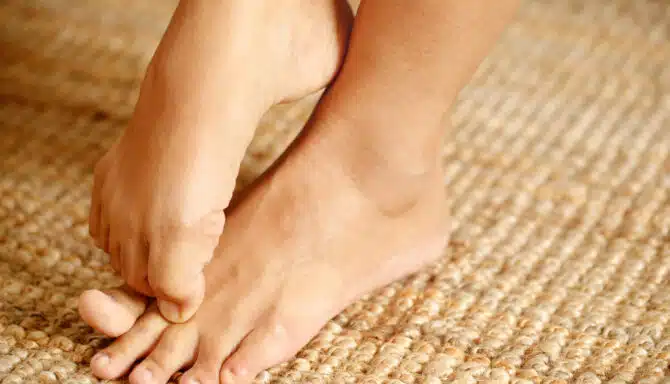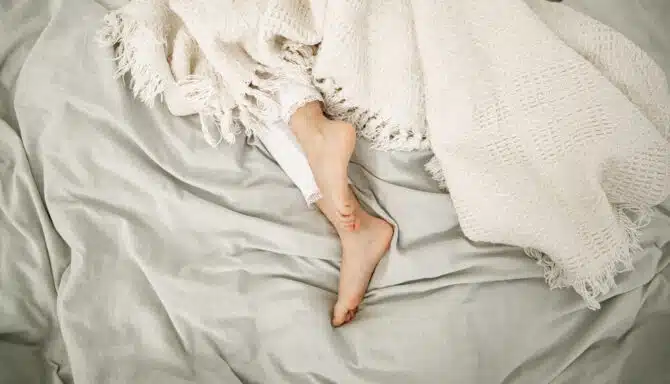Have you ever been going about your daily routine, only to notice a nagging itch in your feet? We tend to hope it will go away on its own, but the itch could become more persistent and start to interfere with our well being. It is widely known that itchy skin can be incredibly distracting, arguably even more so when it’s on our feet. This is because our feet are harder to access while we are out and about. This leaves us with little choice but to put up with the problem if we have a busy day scheduled.
If this problem does not go away, and is accompanied with a scaly, red rash, then one should take the time to gain knowledge about the potential causes, as well as potentially schedule an appointment at a Foot clinic. In this article, we will discuss the common foot conditions associated with itchy feet, and go over some treatment options and preventative care. This will hopefully get you back to your daily routine in downtown Toronto, free from the burden of itchy feet!
Common Causes Of Itchy Feet Include:
- Athlete’s Foot
- Psoriasis / Psoriatic Arthritis
- Allergic Reaction
- Eczema / Dyshidrotic Eczema
- Diabetes
Athlete’s Foot
The explanation for your itchy could be that you’ve contracted Athlete’s Foot. Athlete’s foot is a common foot condition that can affect anyone, despite its name. It is similar to eczema in the way it presents itself as a scaly rash that may burn, itch or sting, and be the most troublesome around the toes. While the symptoms are similar to eczema, athlete’s foot comes from fungal growth on the feet, and is technically an infection. Those affected usually acquire this from walking barefoot in areas such as public showers, indoor swimming pools, or other areas where many people are walking barefoot. Other contributing factors include moisture build up around the feet, such as wearing damp socks.
In order to prevent athlete’s foot, you should bring flip-flops to wear in contagious areas. This will protect your feet from places like public showers. You should also ensure that your feet are thoroughly dry after a long day of wearing warm boots or shoes. You may also want to consider wearing socks that repel moisture.
Treatment:
- Topical antifungals
- Ointments
- Sprays
- Medicinal creams
You should make an appointment to see a licensed Chiropodist, as athlete’s foot can come back even after you think it’s been dealt with. In a situation where it persists, your chiropodist may prescribe an oral anti-fungal pill or ointment. It is very important to follow through with the treatment plan until your chiropodist can confirm that the infection is gone.
Psoriasis / Psoriatic Arthritis
Psoriatic Arthritis is an inflammatory arthritic condition that presents itself in people who have psoriasis. Psoriasis is a dermatological condition, and approximately 10 percent of psoriasis patients can develop psoriatic arthritis. According to the Arthritis Society, psoriasis attacks your immune system and produces red, scaly patches on the skin of your feet that feel painful and itchy.
If you’re experiencing joint pain along with your itchy rash, it is possible that you have psoriatic arthritis. If the itchy rashes on your feet are worsening and accompanied with other symptoms, you should seek help from a chiropodist as soon as possible. Other symptoms include swollen toes, and foot pain felt in the heel and sole.
Treatment:
You should seek help from a chiropodist if you suspect you have this condition. It can be very debilitating, and at-home care can only go so far. A chiropodist can prescribe anti-inflammatory medication and anti-rheumatoid medication.
Allergic Reaction
Your itchy feet may be the result of a new product that, unbeknownst to you, has been irritating your skin. This will lead to a frustrating, itchy rash on your feet and the task of figuring out what’s causing this. Irritants in the following products can be known to cause allergic reactions on the feet:
- Nail products
- Lotions
- Body wash/soaps
- Laundry products
- Shoe rubber
Treatment:
If you think you may be having an allergic reaction, you should get an allergy test as soon as possible to gain more knowledge about what products you should avoid. If you have an idea of what it could be already, you should avoid this product and remove it from your home.
Soothing over-the-counter products, such as calamine lotion, can help with the itchiness. You can also apply a cool, damp towel to your feet to relieve the itch.

Dyshidrotic Eczema
Dyshidrotic Eczema refers to eczema that specifically affects the hands and feet. Small Blisters, referred to as “intensely itchy” by the National Eczema Association, will form between your toes and on the soles of your feet. During the winter, moisture build up caused by wearing winter boots and socks for long periods of time can cause a flare up. Other factors to consider include stress and hay fever. The scratching caused by the intense itch can lead to further skin irritation and a potential infection.
Treatment:
Gehwol products have been known to soothe skin that is dry, cracked, red and inflamed. In particular, their creams are also designed for sensitive skin and can be a real comfort for those experiencing eczema on their feet. The ingredients used also prevent infection. If the skin on your feet has become red and inflamed due to excessive scratching, you should consider their products. Other treatment and preventative options include:
- Sometimes with enlarged blisters, drainage is necessary.
- Stay away from irritants found in detergents and other products.
- Thoroughly dry your feet after showers, or long days spent in winter boots and socks.
- Sweat repellent socks can be useful in fighting moisture build up.
- In extreme cases, certain oral medications may be prescribed.
Diabetes
If you suffer from Diabetes, it is possible that this is culprit behind your itchy feet. Diabetes can cause a general itchiness due to the nerve damage caused by fluctuating blood sugar levels. Diabetes related itching can also be caused by prohibited blood flow to the feet. After a period of elevated blood sugar levels, a diabetes patient may notice their feet are itchy.
Treatment:
- Avoid products made with harsh chemicals.
- Use moisturizer on your feet twice per day.
- Choose scent-free/allergenic-free laundry detergents.
- Avoid having damp feet as much as possible, as they can aggravate the itch.
In addition to the treatment methods mentioned above, regular visits with a chiropodist have been proven to alleviate diabetes-related foot conditions. You will benefit from a Thorough assessment, a treatment plan, preventative care and helpful medications.
Worry Not!
If you’re experiencing a nagging itch in your feet, we want to hear about it! It could be nothing, or it could go away on it’s own, but it is possible that you are experiencing the early stages of a foot condition. We pride ourselves in effectively communicating your concerns and needs as comfortably as possible. Call anytime to ask about your specific concern and we’ll make sure to provide actionable steps towards getting your feet as happy and healthy as possible!
Call us at 416-769-FEET (3338) or Book Your Assessment Today!












